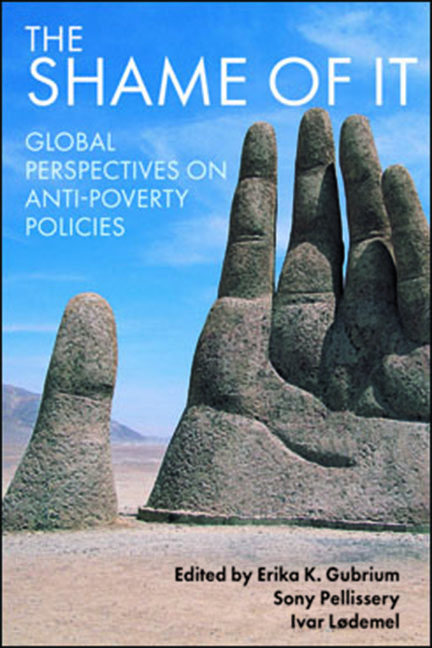Book contents
- Frontmatter
- Dedication
- Contents
- Notes on contributors
- Acknowledgements
- Preface
- one Resetting the stage
- two New urban poverty and new welfare provision: China’s dibao system
- three Thick poverty, thicker society and thin state: policy spaces for human dignity in India
- four Self-sufficiency, social assistance and the shaming of poverty in South Korea
- five ‘Not good enough’: social assistance and shaming in Norway
- six Pakistan: a journey of poverty-induced shame
- seven Separating the sheep from the goats: tackling poverty in Britain for over four centuries
- eight ‘Food that cannot be eaten’: the shame of Uganda’s anti-poverty policies
- nine Shame and shaming in policy processes
- ten Towards global principles for dignity-based anti-poverty policies
- Index
three - Thick poverty, thicker society and thin state: policy spaces for human dignity in India
Published online by Cambridge University Press: 03 February 2022
- Frontmatter
- Dedication
- Contents
- Notes on contributors
- Acknowledgements
- Preface
- one Resetting the stage
- two New urban poverty and new welfare provision: China’s dibao system
- three Thick poverty, thicker society and thin state: policy spaces for human dignity in India
- four Self-sufficiency, social assistance and the shaming of poverty in South Korea
- five ‘Not good enough’: social assistance and shaming in Norway
- six Pakistan: a journey of poverty-induced shame
- seven Separating the sheep from the goats: tackling poverty in Britain for over four centuries
- eight ‘Food that cannot be eaten’: the shame of Uganda’s anti-poverty policies
- nine Shame and shaming in policy processes
- ten Towards global principles for dignity-based anti-poverty policies
- Index
Summary
Introduction
India is home to the largest number of poor people in the world. Of 1.13 billion people, 27.8 per cent live below the conservative income-based poverty line set by the Indian government and can thus be said to live in absolute poverty (Planning Commission, 2012). The face of this deep and persistent poverty is observable in minimal health expenditure, in the fact that more than 50 per cent of the population lives without sanitation facilities, in the presence of undignified ageing, as well as in poor educational standards, malnourished bodies, inferior housing, poor infrastructure resulting in deterioration in the quality of life, widespread child labour and poor service delivery. All of these attributes have severe implications for interpersonal relationships within the Indian household, village, workplace and broader community.
As a polity, India is a democratic country with huge diversity (28 federal states and 7 union territories, over 1,500 languages, 16 climatic regions and various orientations of faith). While this cultural richness of diversity has been celebrated, it has also been a primary challenge to the country's economic progress. This complexity is reflected in the web of social relationships that we allude to in the title for this chapter. This ‘thicker society’ creates poverty and undermines the policy efforts to eliminate poverty. Although India has made tremendous economic strides in recent years, this has primarily been the case in the country's urban centres, yet over 68 per cent of the population still resides in rural areas. While close to 60 per cent of the workforce is involved in the less mechanised agricultural sector, the contribution of agriculture to gross domestic product (GDP) is as low as 15 per cent. Inability to move people from agriculture to industrial or service sectors has been largely due to the limited spread of education, and this is reflected in low literacy rates and a limited supply of skilled manpower. Poor agricultural productivity and limited mobility to other sectors has, in fact, reportedly led to multiple waves of farmer suicides in the past two decades (Reddy and Mishra, 2009). Moreover, while daily casual wage labour in rural and urban areas is considered to be the last resort to make ends meet, this currently represents the situation for approximately 40 per cent of the total workforce.
- Type
- Chapter
- Information
- The Shame of ItGlobal Perspectives on Anti-Poverty Policies, pp. 37 - 60Publisher: Bristol University PressPrint publication year: 2013



